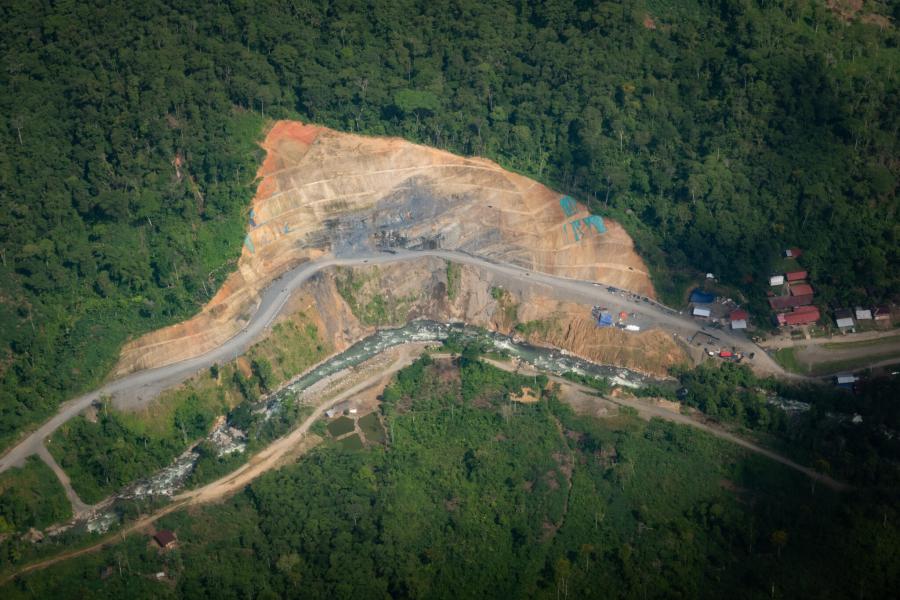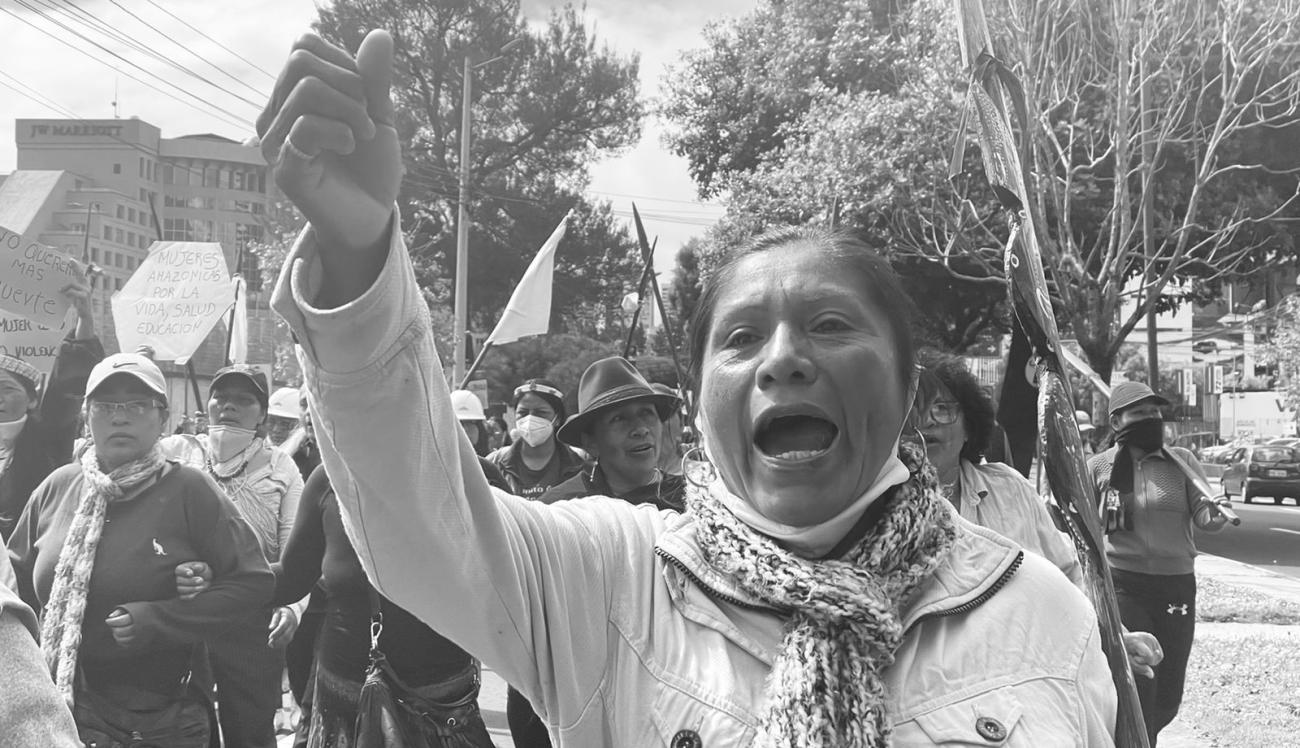
By Katya Yegorov-Crate (CS Intern)
Ecuador is almost two weeks into a national strike called for and led by Indigenous, trade union, and social organizations. Nationwide demonstrations are the consequences of the Ecuadorian government’s failure to address pre-existing problems that have been exacerbated by the COVID-19 pandemic and President Guillermo Lasso’s failing neoliberal policies, which have imposed even greater economic burdens on Ecuador’s most vulnerable populations – Indigenous Peoples, Afro-descendant Peoples, and rural communities. Indigenous communities are facing deficits in healthcare, education, and job security while also defending their ancestral lands from illegal mining and destructive resource extraction encouraged by Lasso’s policies.
“The Indigenous Peoples’ movement has not been heard by the Ecuadorian government on specific issues such as education, health, and the economy. In response to this, we carried out this national mobilization. It has been 16 days in which we have received a lot of violence from the Armed Forces and Public Forces. Our voices have not been heard and the community press has not been respected. On June 24, several people were beaten, injured, and detained. However, we are standing up in this struggle, in resistance to this crisis situation in Ecuador,” stated, Indira Vargas (Kichwa) of Confederation of Indigenous Nationalities of the Ecuadorian Amazon (CONFENIAE), a regional organization and a Cultural Survival Keepers of the Earth Fund Grant Partner dedicated to the defense and legalization of indigenous territories and the protection of their natural resources.
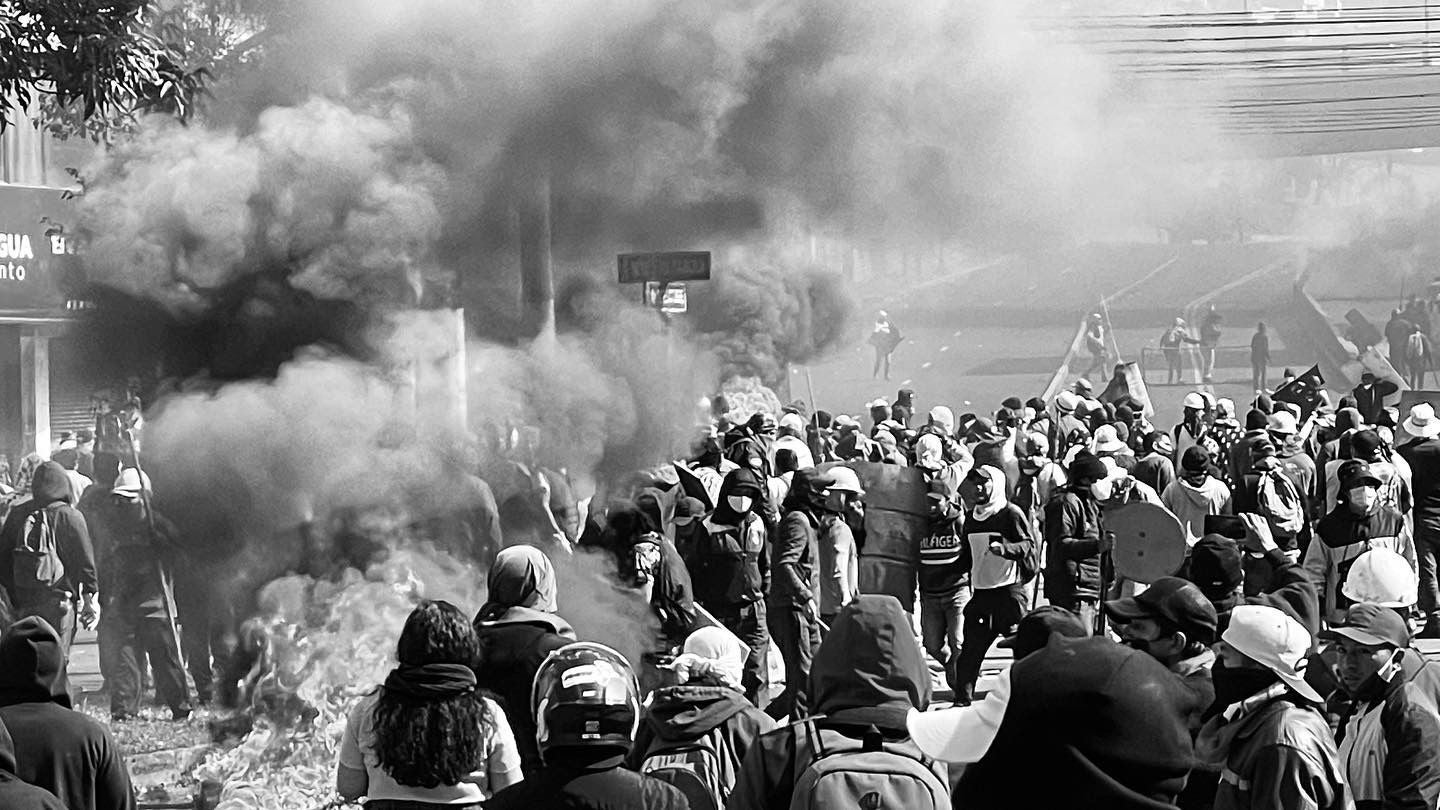
On June 13, 2022, after a year of fruitless dialogues and negotiations between the Lasso government and Indigenous organizations, the Confederation of Indigenous Nationalities of Ecuador (CONAIE), with the backing of various social movements, called for regional mobilizations across the country. The mobilizations are driven by the imposition of government policies that have resulted in the intensification of poverty, a reduced general state budget for health and education sectors, lessened social equality policies, a rise in instability and violence in multiple areas, aggressive levying of extractive policies and activities, and violation of the collective rights of Indigenous Peoples, and the rights of Afro-descendant communities. These communities have been disproportionately negatively impacted by inflation, rising fuel costs, and austerity measures such as tax increases, and spending cuts. CONAIE is calling for economic reforms that will tackle broadening inequality in Ecuador––a country still grappling with the economic devastation caused by the pandemic.
Frustration wrought by soaring inflation has served as an impetus for massive protests in Ecuador before. This time, CONAIE is demanding fuel prices, which are rising exponentially after the end of COVID-era subsidization, be cut, price controls be enforced on agricultural products, and larger budgets be set for education. The organization has put forth a list of ten demands for the Ecuadorian government to meet:
- Set a limit on rising fuel prices and implement subsidies for vulnerable sectors;
- Supply debt relief and economic aid, impose minimum one-year moratorium on evictions and foreclosures;
- Set fair prices on farm produce in three regions of the country so that millions of small to mid-sized farms can continue producing sustainably; agricultural subsidy; and non-signing of Free Trade Agreements that destroy national production;
- Implement strong labor rights with public investment and social policies to combat job insecurity and freedom to unionize;
- Immediate repeal of Executive Decrees 95 and 151, which aim to expand mining projects and increase oil production on Indigenous territories; conduct audits and comprehensive reparation distribution for socio-environmental impacts caused by extractive projects;
- Honor Indigenous Peoples’ 21 collective rights such as the right to bilingual; intercultural education, Indigenous justice, access to Free, Prior and Informed Consent and self-determination;
- Stop the privatization of critical strategic sectors such as healthcare, transportation, and hydroelectric energy;
- Implement price control policies to prevent price gouging in supermarket chains;
- Enact health and education reform. Address critical budget concerns for hospitals; experiencing staffing and supply shortages. Guarantee young people access to higher education and better infrastructure in public schools, colleges, and universities;
- Ensure security, protection, and the creation of effective public policies to control the wave of drug trafficking, violence, kidnapping and organized crime that has increased in Ecuador.
Katy Mochao (Kichwa), a member of CONFENIAE communications team states, “We are firm in our minimum 10-demands list, which does not solve all the problems but is an important step towards ensuring decent living conditions. The message to the international community is to break the media circus and join and show solidarity with our struggle. We are nothing of what the government says. We are people who have come to protest peacefully for fundamental issues, for having the minimum conditions for a dignified life.”
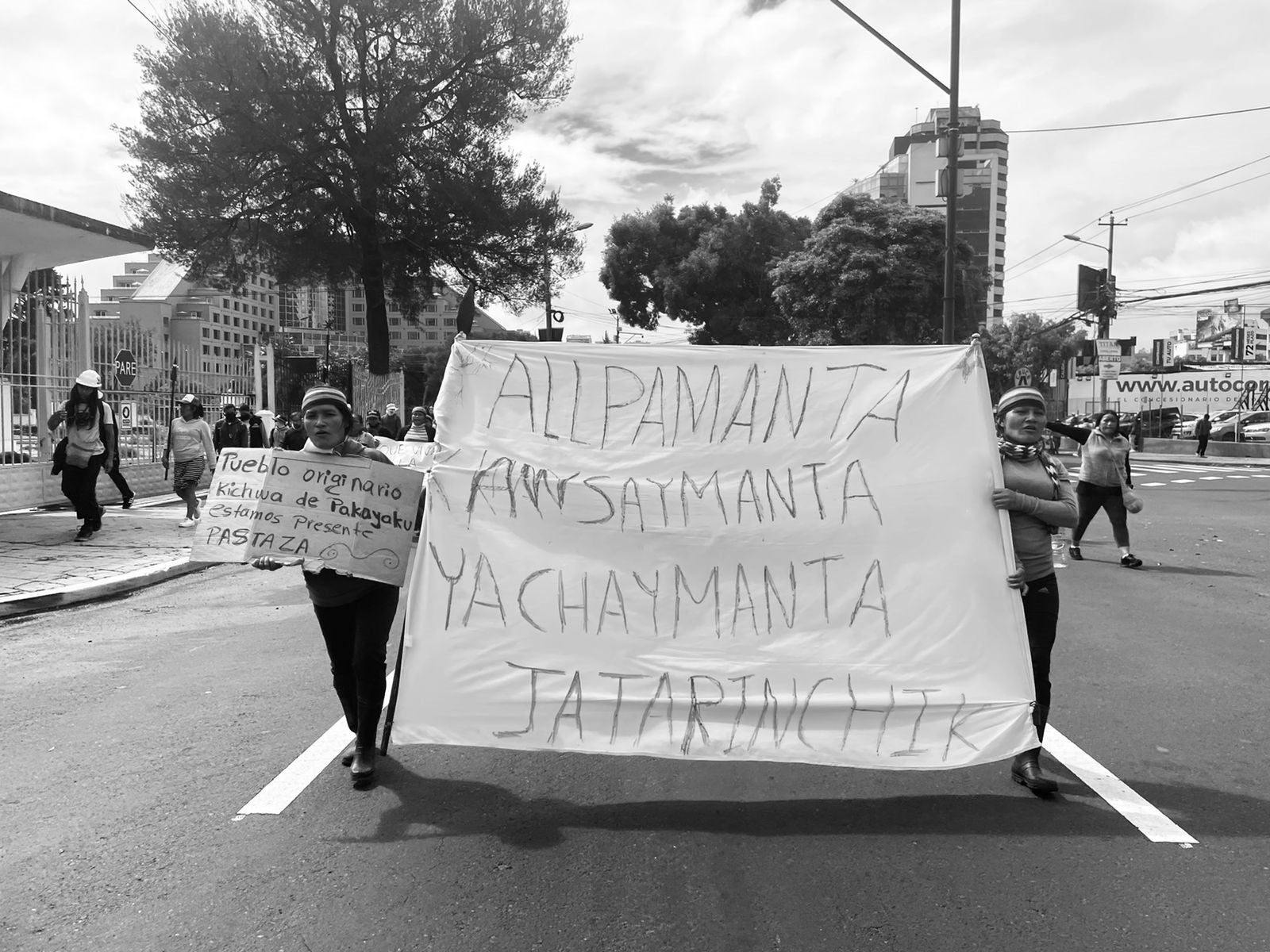
Indigenous leaders have proposed this list of demands to Lasso to address their essential needs and to respect their legally established rights to refuse extractive projects ruining their lands and water sources. Numerous organizations, such as La Via Campesina –– an international movement in which five Ecuadorian campesino and Indigenous organizations are involved –– have supported this petition, calling it “...fair, at a time when, according to official statistics, 5 out of 10 people in Ecuador who live in the countryside are living in poverty and 3 out of 10 are in extreme poverty. This is a hard reality that peasants and Indigenous Peoples and nations, as well as rural populations of the countryside, are going through; those who have been directly affected by the free trade policies that the government has implemented under the pressure of the IMF and other international organizations.”
“We ask to have our Constitutional rights, the right to Free, Prior and Informed Consent guaranteed, and for [Guillermo Lasso] to honor [his] word against mining and oil,” says Leonidas Iza Salazar, President of CONAIE.
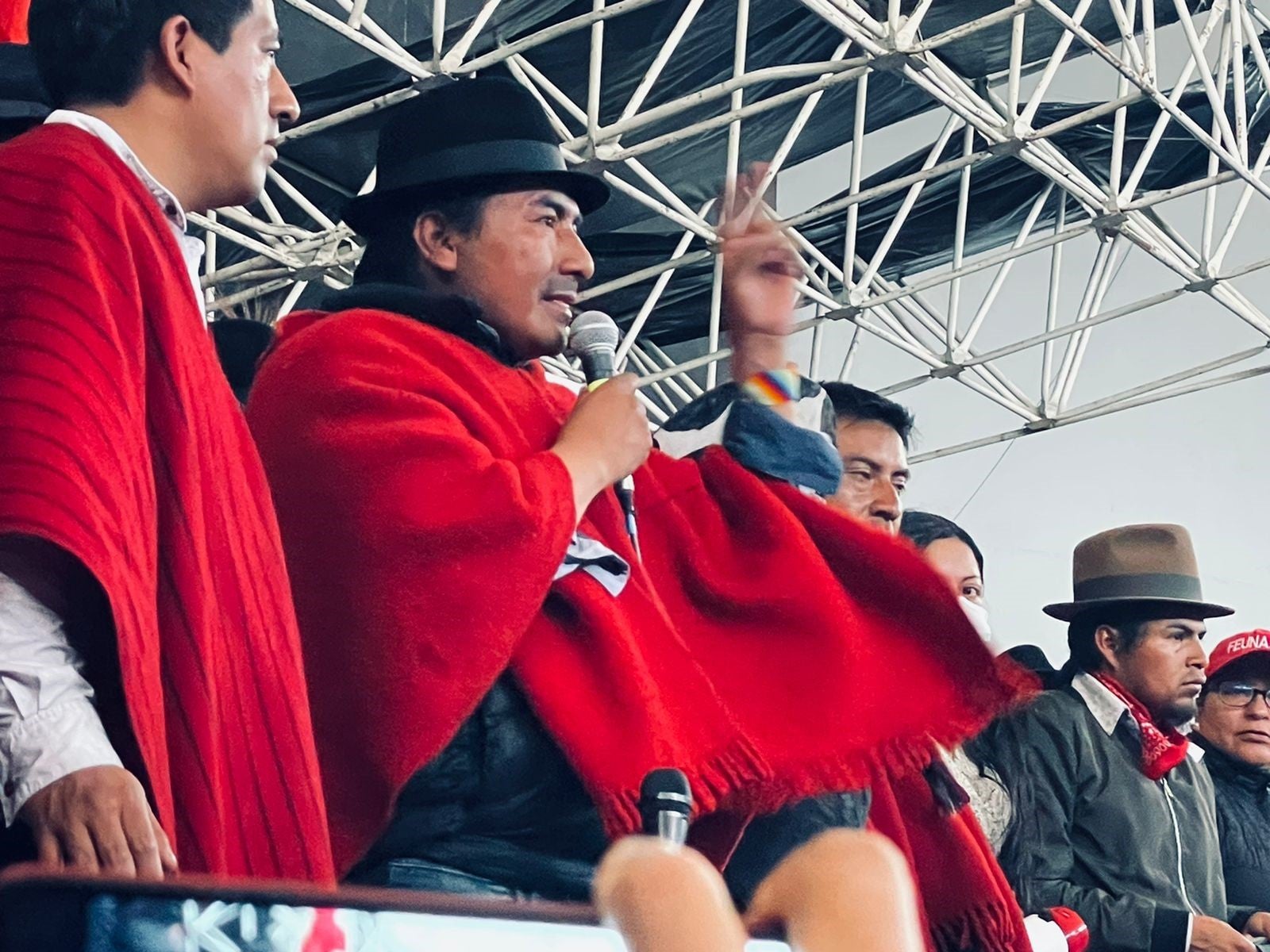
Protestors have constructed roadblocks to disconnect major routes to Quito, the capital. Protestors and armed forces and riot police have collided, causing further disruption of supplies. From the start of this mobilization, the Lasso administration’s response has been to stigmatize, suppress, and criminalize protestors, which has led to numerous human rights violations, deprivation of leaders’ and demonstrators’ liberties, unlawful detentions, and a disproportionate use of violent force by state security agents. On June 14, Leonidas Iza Salazar (Kichwa Panzaleo), president of CONAIE, was detained and placed in solitary confinement before two judges declared Iza’s arrest legal and dismissed numerous acts of violence and rights violations perpetrated against him. Iza’s future remains unclear as he awaits a trial for the crime of “paralyzing a public service” set for July 4. Since June 14, the Ecuador Alliance for Human Rights has documented 79 arrests, 55 injuries, and 39 incidents of human rights violations, including excessive use of force, arbitrary detentions, targeting of journalists, and harassment of civil society organizations.
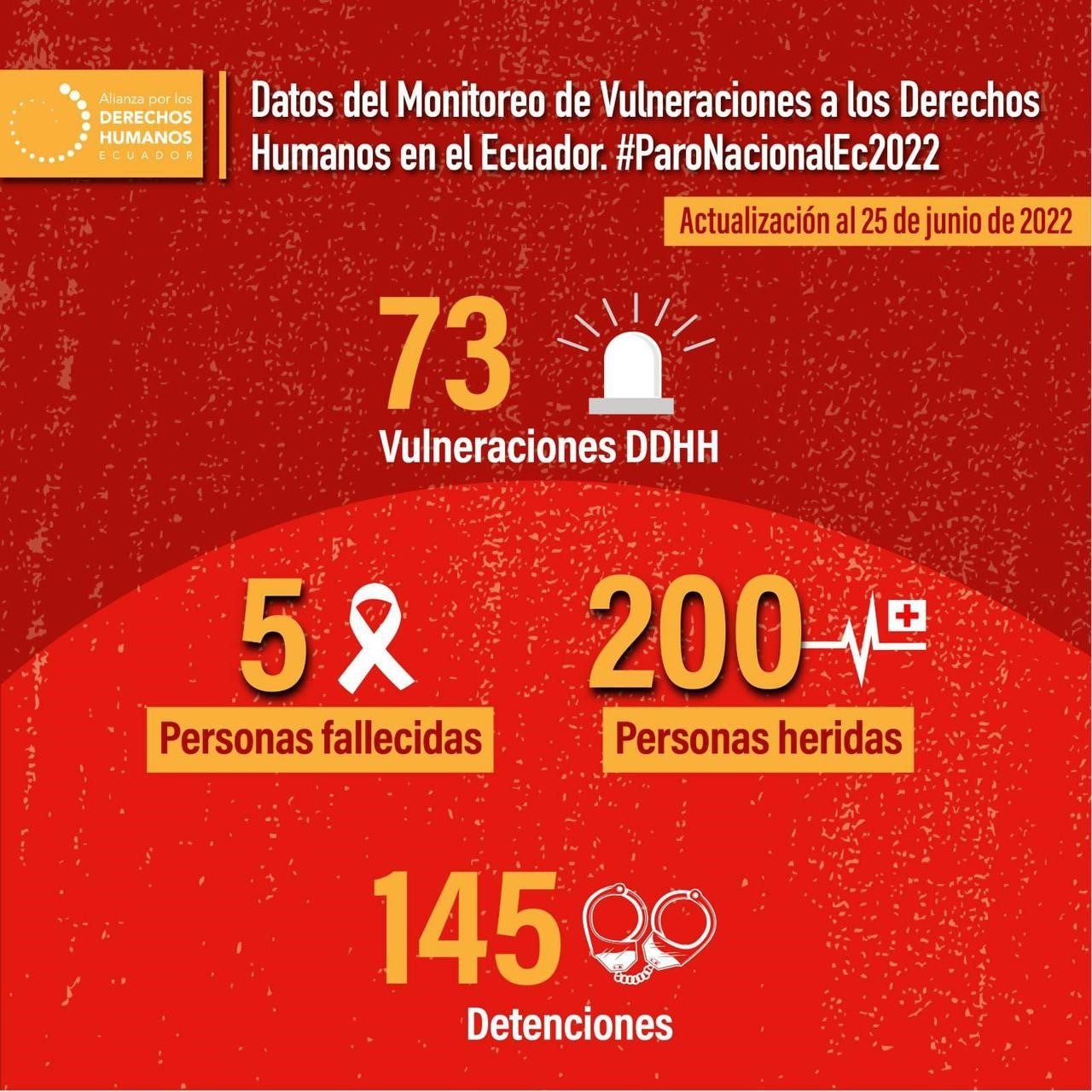
On June 17, Lasso issued Executive Decree 455, which has empowered the president to mobilize armed forces to “maintain order,” suspend civil rights, and enforce a curfew. The decree declared a state of emergency in a number of provinces including Cotopaxi, Pichincha, and Imbabura, and effectively suspended freedom of association, assembly, and movement for 30 days. Furthermore, the decree made Quito a “security zone” under the supervision of the armed forces, who were tasked with “maintaining order” alongside the national police during protests.
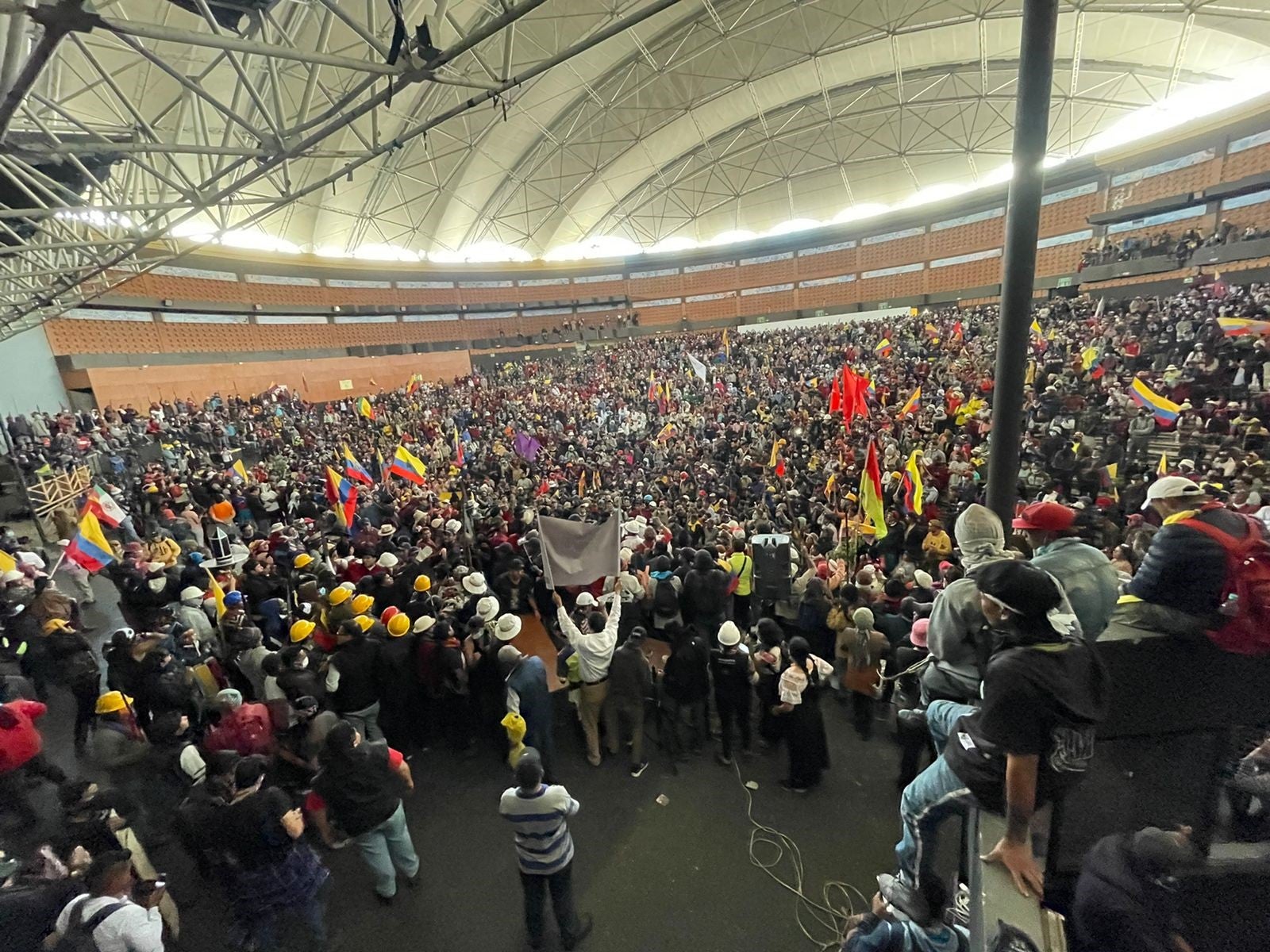
The arrest of an influential leader of the Indigenous Movement in Ecuador such as Iza is a clear indication of the Lasso administration’s aim to severely wound and discourage the movement. Previously, when Lasso staunchly refused to cede to protestors’ demands, the president and government agencies perpetuated the narrative that property damage is greater violence than the impact of nationwide starvation and police brutality. The enactment of a state of emergency in various provinces; police occupation of the Casa de la Cultura, an institution that defends freedom of speech and has historically protected social movements during protests; and the president’s televised remarks that he “called for dialogue and the answer was more violence. There is no intention to find solutions,” all perpetuate the state’s claim that the Indigenous Movement is intent on staging a coup. Moreover, the government is spreading misinformation that the demonstrations have been infiltrated by criminal organizations. The Lasso administration's claims that their willingness for mediation and dialogue has been met with unwillingness and violence from the other side blatantly ignore the fact that Indigenous organizations have been meeting with the administration for the past year to no avail. Iza had met with President Lasso multiple times over the last year and every meeting had ended with empty promises.
At present, Lasso has only somewhat addressed demonstrators’ demands, announcing plans to subsidize fertilizer costs for small and medium-sized agricultural enterprises, forgive overdue loans worth up to $3,000, and limit the cost of diesel. While these plans may present an image of compromise, they are unacceptable, since fuel prices will still be above what protestors seek and the loan forgiveness is too limited. On June 23, security forces retreated from the Casa de la Cultura, permitting resumed use of it by protestors. Nevertheless, violent nighttime confrontations, a number of incidents on the afternoon of June 24, and Iza’s support for attempts to remove Lasso have re-elevated tensions. CONAIE met Friday to further evaluate the government's response to its petition.
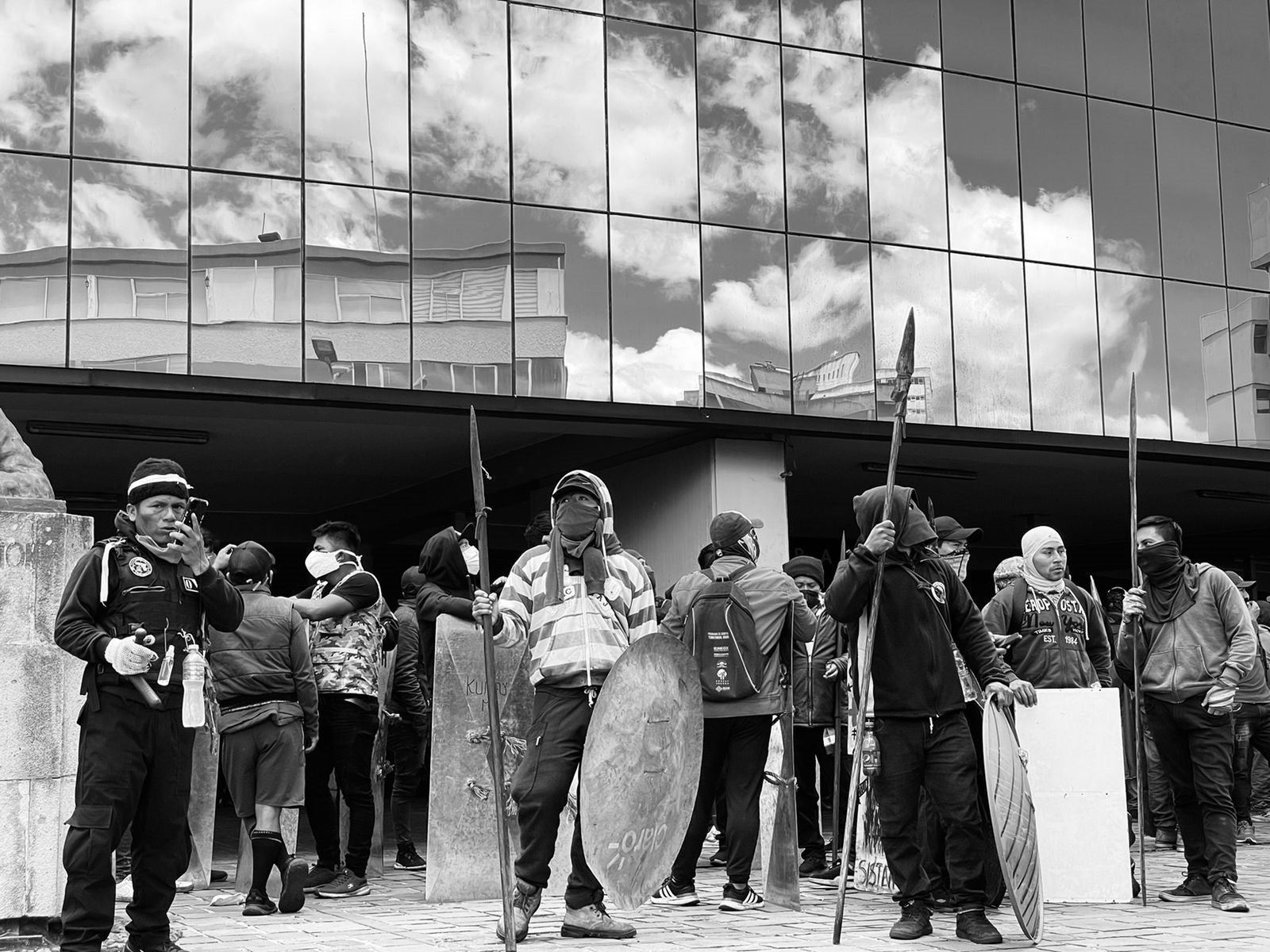
Indigenous leaders demand the removal of security forces and an end to special measures enforced in six provinces prior to discussing the protesting faction’s list of demands. The continued repression of demonstrations by authorities, and Lasso’s recent attempts to discredit Iza, and his continued assertions that security forces will “act with necessary measure to defend under the law,” have not halted the country-wide Indigenous Movement from coming together in solidarity and fighting back. Mobilization is a legitimate right of protest. This criminalization of social protest infringes upon the rights of Indigenous communities seeking to fight the insecurity of living conditions, employment, and extractive exploits that jeopardize their health, lands, and livelihoods. Indigenous leaders have agreed to meet with the government to discuss demands for lower fuel and food prices.
Cultural Survival joins organizations such as Amnesty International, Amazon Frontlines, and La Via Campesina in expressing our full support for Indigenous and Afro-descendant Peoples and Nations of Ecuador and demanding that the State:
- Respect mobilization as a legitimate right of protest and freedom of speech;
- Fulfill the demands and the ten-point petition submitted by the CONAIE;
- Ensure respect and protection for the self-determination and rights of Indigenous Peoples in Ecuador;
- Ensure the rights of Leonidas Iza Salazar and protect his life and health;
- Observe national and international human rights laws in a fair, just, and impartial manner;
- Cease and abstain from the criminalization and persecution of defenders of human rights, lands, and territories.
Take action:
- Sign Amazon Frontline’s “Protect Indigenous Peoples’ Right to Protest” letter.
- Write an appeal to President Guillermo Lasso
- Sign the “Violation of Rights in Ecuador and Criminalization of Social Protest” form.
All photos by Indira Vargas, Lancera Digital, and CONFENIAE.


